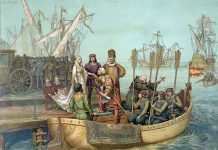Daniel Defoe, for some time we dreamed of being in the place of Robinson Crusoe, experiencing incredible adventures, testing ourselves for strength. With the beginning of adulthood, youthful romance faded into the past, and the dream of living on a desert island disappeared like the smoke of a dying campfire. However, this was not the case for everyone…
Couldn’t stand the loneliness
Italian Marcello Villaggio did not plan to become Robinson, first he had to hide from the police, who were looking for him for nefarious deeds. Showing ingenuity and resourcefulness, he managed to get into the hold of a cargo ship that was going to South America. Along the way, the “hare” was caught and, so that he would not eat his bread for nothing, he was forcibly enlisted as a sailor. The Italian did not like the harsh life of a sailor, and seizing the moment when the crew got drunk in the evening on the occasion of the captain’s birthday, Villaggio loaded water and food supplies into the boat, launched it and escaped from the ship.
Marcello expected to find a desert island and live on it for his own pleasure without the meticulous policemen and the carping of the boatswain. Fortunately, he captured enough water and food, as he had to search for the island for weeks.
The first days Marcello was blissful, ate fruit, baked crabs on the fire, basked in the sun. However, after a few months, the temperamental Italian fell into a terrible depression from loneliness. He sometimes talked to himself and swore obscenely, then lay silently for hours, staring at the sky with his eyes. For almost a year, Villaggio tried to get used to Robinson’s “paradise” life, but he could not. When Marcello realized that he was ready to tear up the remains of his pants, make a rope out of them and strangle himself on the nearest palm tree, he decided to act.
The failed Robinson repaired his boat, loaded it with coconuts, fruits, dried fish, a supply of water and went in search of civilization. His voyage lasted almost a month, fortunately for the Italian, he was barely picked up alive by an American steamer.
In the end, everything ended very well for Villaggio: he was taken out on a steamer and taken to the United States, where he received American citizenship. This whole story happened at the beginning of the XX century, in 1911/12.
I hate this island!
American Patrick Madsen’s attempt to become Robinson ended tragically. In 1948, the 50-year-old Madsen was completely tired of the worldly bustle and decided to hide from civilization on a desert island. He landed on a piece of land he liked in the area of the Caroline Islands. He was advised to take a radio transmitter with him in order to be able to contact the civilized world if necessary, but Maleen categorically refused.
Six years later, scientists who found themselves near the Caroline Islands decided to visit Robinson. Alas, no one ran out to meet them. Inside a dilapidated hut made of reeds and bamboo, they found the skeleton of Robinson. Patrick’s diary was found next to the half-decayed remains. The last entry in it was made on May 17, 1951. Here is its content: “A little more and I’m finished. Severe fever and weakness in the body. It looks like I’ve caught a tropical fever. I hate this island and I curse the day when I decided on a crazy idea — to leave the world and become an islander. Oh, if only now, at this moment, they could be in my house in San Francisco!” they land on uninhabited islands, becoming Robinsons… In 1963, the French reporter Georges de Con decided to experience all the “charms” of Robinson’s life on his own skin, and then glorify his name with reports about living on a desert island.
Georges landed on the deserted island of Eiao in Polynesia. The reporter didn’t want to strain himself with getting food, so he took a fair supply of canned food with him. The Frenchman had medicines, tools, and even a radio transmitter. That’s what he took for a reason! Four months later, an 808 signal was received from the reporter.
Rescuers immediately went to the island and found the emaciated Robinson (Georges lost 16 kg!), who was in complete despair and on the verge of a nervous breakdown. As the reporter later admitted, loneliness turned out to be so unbearable for him that a little more and he would have killed himself.
Modern life in overpopulated megacities with its frenzied pace, nervous overload, poor ecology makes more and more people think about a quieter life somewhere in the bosom of nature. The craving for solitude has also increased. Alas, there are no abandoned islands left, and it’s much more difficult to settle on an uninhabited piece of land in the middle of the ocean now. Many countries now rent uninhabited islands, and for a tidy sum. In order to become a Robinson crusoe in the modern world, alas, you have to be a wealthy person. However, the amounts are different everywhere. For example, a former resident of the Bavarian city of Munich (Germany), a mechanic by profession, Friedrich Texter managed to rent a small island of Tamlagune in the Philippine Archipelago for 99 years for only 6000 German marks. Now he lives in a bamboo hut, grows fruits and vegetables, catches fish and raises chickens. And he doesn’t need to spend money on clothes – just one loincloth is enough.
In order to settle on the small island of Tuin off the southern coast of Australia, he, according to local laws, had to… get married. Of course, he had to take the choice of his wife very responsibly, because she had to bear with him all the hardships of life on a desert island.
Gerald advertised in the London marriage newspaper, where he offered the applicants for his heart to be seduced by a life together on a deserted island. To his surprise, several dozen girls responded to the ad, he had to arrange a kind of casting among them for the role of his wife. In the end, he chose a pretty 24-year-old Lucy Irwin, an employee of one of the firms.
Their life together began very romantically. A bottle of champagne saved from civilized life regularly shot a cork, spewing out almost half of the contents along with foam. They clinked glasses, kissed under the starry sky, sank down on the sand next to the crackling fire… Alas, then the prose of life began. Food was constantly in short supply, it was necessary to go very far for fresh water. Attempts to grow something gave a pathetic result.
Lucy, who dreamed that she would wallow in the warm sea every day, was afraid to go into the water even up to her waist — the fins of hungry sharks were constantly dissecting the water near the shore. The unfortunate girl was pestered by various insects, whose bites itched terribly and often swelled with red sores on her body. Completely disappointed in both romance and her husband, Lucy barely waited for the first ship on which she left the island. After returning to England, she wrote the book “Eva and Mr. Robinson”, in which she frankly described all the vicissitudes of her 1.5-month life on the island.
The book described the sufferings of the unfortunate girl, she was hunted by sharks, she was eaten alive by mosquitoes and other flying and crawling creatures. Moreover, Robinson himself turned out to be an obnoxious character, in addition, a real incompetent — he hardly lit a fire, did not fish well, and his vegetables did not grow. Lucy’s book aroused some interest, and she herself became a celebrity for a while.
And what happened to Gerald, abandoned by his young wife? As the easts who visited the island later wrote about him, after becoming a bachelor again, he became quite comfortable on the island, and fish began to be caught from him, and the fire burned without fading. But Robinson was still unlucky with the vegetable garden, but the natives from the neighboring islands began to supply him with meat and vegetables, to whom he repaired boat motors.
Don’t save me!
The sailors from the American warship Glavier were shocked to the depths of their souls when, arriving to rescue a lonely man on a deserted island in the Cook Archipelago, who was spotted by helicopter pilots, they were subjected to a real feat on his part. Robinson of a respectable age threw empty cans and stones at them and at the same time shouted: “Don’t save me! Go to the devil! How much can you molest a person!”
At first, the Americans thought that the unfortunate man’s mind was clouded by everything he had experienced. They already wanted to catch the “crazy” Robinson and evacuate him from the island by force, but he calmed down a little and entered into negotiations with rescuers. It turned out that Robinson’s name was Tom Neal, he was from New Zealand and came to the island of his own free will, and not as a result of a shipwreck. For 30 months he has been enjoying solitude here, and only from time to time this whole idyll of merging with nature is spoiled by various volunteer rescuers trying to bring him back to civilization.
The Americans listened to Robinson, listened, and left him alone.
Tom’s island was forced to retire by such “benefits” of civilization as the constant hustle, stink and noise of cars, annoying ads hitting the eyes, phone calls waking up at night, television reports about crimes, catastrophes and wars. Neil decided that only on a desert island he would be able to live a calm and measured life. Although Tom took a transistor with him to the island, he only listens to the weather forecast on it in order to find out about a hurricane in time, which can easily demolish all his buildings and deprive him of other property acquired on the island for many years.
And Nile settled down on the island thoroughly: he built a house with many outbuildings on a small hillock next to a stream, built a chicken coop. Robinson grew beans, pumpkins, corn, onions and even tomatoes in his garden. In a quiet lagoon, Tom was fishing for a sufficient number of fish for his needs. In short, he had no problems with nutrition.
Every day of Robinson was very busy. He got up early, before sunrise, cleaned himself up, then took a walk along the shore with the dog, looking at what the sea had brought him during the night. Of course, logs and planks were of the greatest interest to him, the strongest of them he used to repair his buildings, the rest were used as fuel. He also picked up glass balls from fishing nets with which he decorated the hut. Then he did housework there (washing, cooking, etc.), fed chickens and collected eggs, then it was time to work in the garden. After lunch, I rested there, calmly digesting food and thinking about upcoming affairs. In the afternoon, he either fished or did household chores again. At 17 o’clock he finished his working day, climbed on a coral block thrown out by a storm, and smoked a cigarette, admiring the setting sun.
For more than forty years, Tom Neal has left the island only once to attach a book he wrote in New Zealand, “The Island I Own alone.” With the fee, he bought new clothes, tools, various household trifles, stocked up on salt, sugar and cigarettes. After that, Robinson hurried back to his beloved island. In August 1977, at an advanced age, Tom Neal nevertheless returned to his homeland.
Psychologists say that loneliness kills: in the case of Tom Neal, this is clearly not the case, it seems, on the contrary, it prolonged his life. We are all different, maybe you should live on a desert island or at least on a remote farm for a month or two to find peace of mind? Think about it!




































